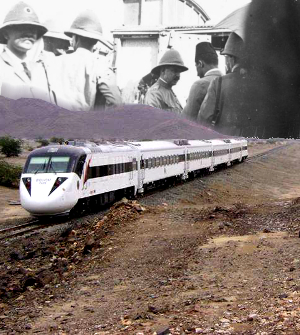Novel sight brings excitement in train-lacking nation
 A strange sight has been spotted snaking its way across Sudan, as the crisp new Nile Train carves its way through the landscape.
A strange sight has been spotted snaking its way across Sudan, as the crisp new Nile Train carves its way through the landscape.
The Nile Train began Sudan’s first daily passenger service for several years this January.
The sleek new train is part of efforts to revive the Sudanese railway system, despite an economic crisis leaving the country ravaged by inflation and starved of hard currency.
Four coaches now roll out of a formerly abandoned station in the industrial area of North Khartoum per day. They head north with just two stops before reaching the railway junction town of Atbara.
The 300km journey takes six hours and forty minutes, a great deal faster than the nations two other trains.
The older engines now do a run to Nyala, in war-torn Darfur, every two weeks, and another takes a weekly trip north of Atbara to Wadi Halfa, near the Egyptian border.
Every single service of the new Nile Train is packed, authorities say, and they are trying to run as often as possible, but the weary state of Sudan’s tracks mean it cannot run at full speed.
Sudan bought two of the trains from China at a total cost of around $13 million, which will be paid over about four years.
Reporters speaking to some of the first passengers on the Nile line says they are thrilled at almost every aspect.
The new train is considered much safer than the bus option, with one passenger also marvelling at how the air-conditioned carriages keep clothes free of desert dust during the trip to North Khartoum.
The success has spurred Sudan to ramp up efforts to fix its rail network.
Sudanese and Chinese firms have been replacing wooden railway ties with concrete on the Khartoum-Atbara line, while track work has also started between Atbara and the trade centre of Port Sudan.
The Khartoum-Atbara route formed part of the main line to Port Sudan and dates from 1898, the year before Britain and Egypt began to jointly administer Sudan, the railway's website says.
An efficient rail system would be an asset for the country which has been desperate for hard currency since the loss of about 75 percent of its oil production when South Sudan separated in 2011.
The impoverished nation is also buying around fifty new freight trains from, to replace those that have been sitting idle since a US trade embargo deprived Sudan of parts for its American-made engines.








 Print
Print